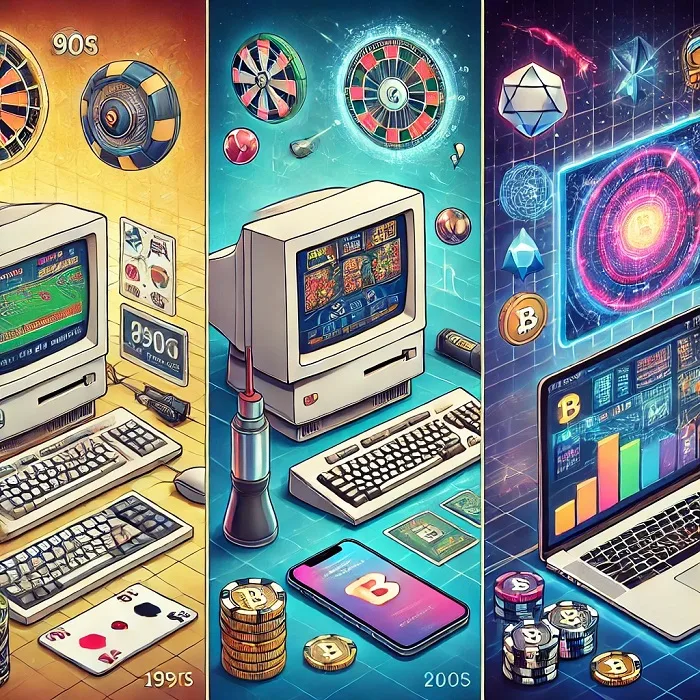
The Evolution of Online Casinos: From the First Platforms to Modern Technologies
The evolution of online casinos began in the 1990s and has continued to develop rapidly, following technological advancements. Over the past few decades, online casinos have transitioned from simple gaming platforms to advanced interactive systems utilizing artificial intelligence, VR, and blockchain. Thanks to these developments, modern online casinos not only offer a wider range of games but also enhance user security and integrate new payment methods. In this article, we explore the stages of online casino evolution and the technologies shaping their future.
The Beginning of the Online Casino Era
The first online casinos appeared in the mid-1990s when the internet became more accessible to the general public. The dawn of digital gambling was marked by the creation of platforms that allowed people to play for real money without needing to visit physical casinos. With technological advancements, including secure transactions and industry regulations, players gained the ability to enjoy gambling in their own time, from the comfort of their homes. This convenience allowed online casinos to quickly gain popularity among players worldwide.
The Internet’s Influence on Industry Development
The internet was a key factor driving the transformation of the gambling industry. Thanks to the global network, online casinos expanded access to games and ensured transaction reliability, which was crucial for attracting new players. Previously, players were limited to the locations of land-based casinos, but the internet removed these limitations, providing access to games from anywhere in the world. The first platforms offered basic gambling games, but with each passing year, their functionality expanded, adding new features and improvements.
The Shift to Mobile Platforms
With the proliferation of mobile devices in the early 2000s, online casinos began adapting their platforms for mobile users. This allowed players to access games anywhere and anytime, significantly increasing the online casino audience. The absence of a need for a computer or specialized equipment marked a big step forward in user convenience. Players could now enjoy their favorite games directly from their smartphones or tablets, making online casinos even more appealing to different categories of players.
Mobile Casino Apps
With the development of mobile technology, specialized mobile casino apps appeared, offering users convenient access to their favorite games. These apps not only retained all the functions of traditional web platforms but also added new personalization options. For instance, players can receive notifications about new bonuses and promotions, as well as enjoy enhanced graphics and interfaces optimized for touch control. This shift to mobile platforms allowed casinos to attract new users and provide a more individualized gaming experience.

Emerging Technologies and the Future of Online Casinos
Today, online casinos actively use emerging technologies such as blockchain, artificial intelligence, and virtual reality. These technologies not only enhance the security and privacy of players but also improve the user experience, making games more interactive and immersive. Using the latest solutions allows casinos to offer new forms of interaction, such as gaming in virtual worlds with other players, adding a social element to online gambling.
Blockchain and Cryptocurrency Applications
The use of blockchain and cryptocurrencies allows for anonymity and transaction security, which is especially important for modern players who value privacy. This makes online casinos more transparent and reliable, fostering trust among users. The application of cryptocurrencies like Bitcoin and Ethereum not only ensures fast and secure payments but also allows users to bypass restrictions that may exist in certain countries. With blockchain, players can be confident in the fairness of the games, as this technology enables tracking and verifying all actions in the system.
-
 Why Red/Black in Roulette Isn’t 50/50: A Mathematical B...
Why Red/Black in Roulette Isn’t 50/50: A Mathematical B...At first glance, betting on red or black in roulette …
01/07/2026See more -
 The Impact of Mobile Devices on Gambling Game Design an...
The Impact of Mobile Devices on Gambling Game Design an...The widespread adoption of smartphones and tablets has fundamentally reshaped …
12/18/2025See more -
 Casino Games With Skill Elements: Facts Versus Misconce...
Casino Games With Skill Elements: Facts Versus Misconce...Debates about whether skill plays a meaningful role in certain …
12/02/2025See more
